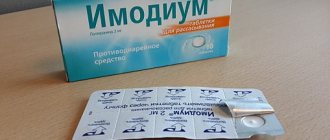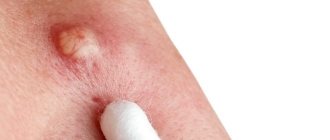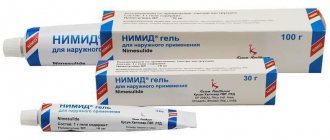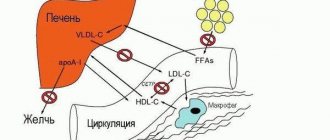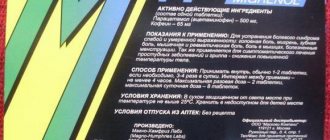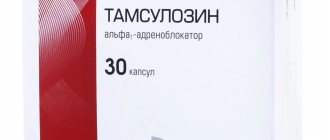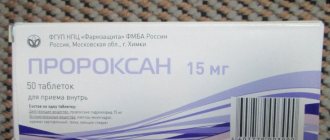Write a review
Reviews: 0
Manufacturers: Irbit chemical plant (Russia)
Active ingredients
- Papaverine
Disease class
- Transient cerebral ischemic attack, unspecified
- Angina pectoris, unspecified
- Other specified peripheral vascular diseases
- Pylorospasm, not elsewhere classified
- Irritable bowel syndrome
- Cholecystitis
- Surgical practice
- Renal colic, unspecified
Clinical and pharmacological group
- Not indicated. See instructions
Pharmacological action
- Antispasmodic
- Hypotensive
Pharmacological group
- Vasodilators
- Myotropic antispasmodics
Composition and release form
Pharmacological group – antispasmodic, hypotensive agent. In Latin - Papaverini hydrochloridum.
International nonproprietary name (INN) – Papaverine.
Chemical formula – C20H22ClNO4.
Papaverine hydrochloride is produced in several dosage forms:
- solution - a transparent substance in ampoules of 2.5 or 10 ml. Cardboard packaging contains 10 ampoules;
- rectal suppositories - have a torpedo shape, white, grayish or yellowish tint. Available in 10 pieces per package in a dosage of 0.02 g;
- tablets for oral administration - 1 - 3 plates in a cardboard box. Each package contains 10 tablets.
Quantitative determination of the drug is carried out in a medium of acetic anhydride and formic acid.
The main active substance of the drug included in the composition is papaverine hydrochloride. Suppositories include an additional component - solid fat. The solution for injection contains methionine, purified water, and disodium edetate as excipients. Tablets contain sucrose, starch, calcium stearate. The dosage of the drug depends on the form of the drug.
pharmachologic effect
Papaverine hydrochloride (Wikipedia indicates that the INN of the drug corresponds to the name of the main active component) is an opium alkaloid that affects smooth muscle elements and causes them to relax, therefore the pharmacological group of the drug is defined as myotropic antispasmodics .
The mechanism of the therapeutic action of the biological substance is to influence the secondary messengers (messengers) of the transmission of muscle excitation. Papaverine inhibits PDE (phosphodiesterase), due to which cAMP calcium ions decreases ; in response to such biochemical changes, the smooth muscles of the internal organs (digestive tube, respiratory and genitourinary systems and vascular bed) relax, their tone decreases .
Pharmacopoeia is a set of mandatory rules and official regulations that guide the manufacture, testing, storage and prescription of medicines to patients. Since the main biologically active component of a pharmaceutical drug is potent, in relation to Papaverine hydrochloride the pharmacopoeia includes the following points for determining the authenticity of a chemical substance:
- Physical characteristics – white crystalline powder, odorless, with a slightly bitter taste.
- Solubility – soluble in water within 40 hours, slightly soluble in 95% alcohol, soluble in chloroform and practically insoluble in ether.
- The acidity of a 2% solution of Papaverine hydrochloride is 3.0-4.5 (determined potentiometrically).
- Chemical authentication control - 0.05 g of a pharmaceutical drug is placed in a porcelain bowl, moistened with a couple of drops of high concentration nitric acid, after which a yellow color should appear, which when heated in a water bath changes to orange.
- Presence of organic impurities - dissolution and color change test in 5 ml of concentrated sulfuric acid.
Pharmacodynamics
Papaverine hydrochloride is classified as an antispasmodic and hypotensive agent. This effect is achieved due to the following action of the drug:
- inhibition of phosphodiesterase enzymes;
- accumulation of adenosine monophosphate in cells;
- decrease in calcium concentration in the body;
- elimination of tone and spasm of smooth muscles;
- decreased excitability and conductivity of the heart (when used in sufficient dosage).
The medicine fights spasms and has a vasodilating effect
The medication has a moderate relaxing effect on the central nervous system. When using large doses, a pronounced sedative effect is observed.
Pharmacokinetics
Absorption of the drug depends on the dosage form. When an injection is administered, the therapeutic effect is observed earlier than when using suppositories and tablets. The average level of bioavailability is 50 – 54%. The formation of metabolites occurs in the liver. The half-life ranges from 30 minutes to several hours. In some cases, this period lasts up to 24 hours. The drug is excreted in the form of metabolites by the kidneys.
Authenticity of properties - Papaverine hydrochloride powder complies with the requirements of the Federal Law and State Fund X, Article 4 for the following indicators: description, reactions to authenticity.
Important! If kidney and liver function are impaired, the medicine is used with caution, since its active components can accumulate in the body.
Papaverine price, where to buy
The pharmaceutical drug is widely known among qualified specialists and is often used in clinical practice, so its cost is not exorbitant. For example, Ukraine offers the following price list:
- price of Papaverine in ampoules – 22 hryvnia;
- rectal suppositories – 21 hryvnia;
- price of oral papaverine hydrochloride – 6 hryvnia.
In the Russian Federation, pharmacy kiosks are less constrained in setting prices for pharmaceutical products, so you can buy a medicine at the following cost:
- tablets – 10 rubles;
- injections for 1 course (packaging solution for injection with 10 ampoules) – 35 rubles;
- the price of suppositories with Papaverine is 62 rubles.
- Online pharmacies in RussiaRussia
- Online pharmacies in UkraineUkraine
- Online pharmacies in KazakhstanKazakhstan
ZdravCity
- Papaverine hydrochloride rectal suppositories.
20 mg 10 pcs. PAO Biosintez 84 rub. order - Papaverine bufus solution for intramuscular and intravenous administration. 20mg/ml amp. polymer 2ml No. 10 RenewalАО Update PFK
122 RUR order
- Papaverine hydrochloride tablets 40 mg 10 pcs. Pharmstandard-Tomskkhimpharm/Pharmstandard-Leksredstva OJSC
15 rub. order
- Dalkhimpharm Papaverine hydrochloride solution for injection. 2% 2ml 10 pcs. JSC Dalkhimfarm
53 RUR order
- Papaverine hydrochloride rectal suppositories. 20 mg 10 pcs. Nizhpharm OJSC
62 RUR order
Pharmacy Dialogue
- Papaverine hydrochloride (amp. 2% 2 ml No. 10) DHF JSC
62 RUR order
- Papaverine suppositories (supp. 20 mg No. 10)Nizhpharm JSC
57 RUR order
- Papaverine hydrochloride bufus (amp. 2% 2 ml No. 10)Update of PFC JSC
100 rub. order
- Platyphylline with papaverine (Table No. 10) Vifitech CJSC
RUB 149 order
- Papaverine h/x (tab. 40 mg No. 10) FS.-Tomskkhimpharm
4 RUR order
show more
Pharmacy24
- Papaverine hydrochloride-Darnitsa 2% 2 ml No. 10 solution PrAT" Pharmaceutical company "Darnitsa", Ukraine
46 UAH. order - Papaverine 20 mg/ml 2 ml No. 10 solution AT "Lekhim-Kharkiv", Ukraine
34 UAH order
- Analgin-dibazole-papaverine No. 10 tablets INTERCHEM Partnership with additional coverage, Ukraine
19 UAH order
PaniPharmacy
- Papaverine ampoule Papaverine liquid solution d/in. 2% amp. 2ml No. 10 Ukraine, Darnitsa ChAO
54 UAH order
- Papaverine ampoule Papaverine liquid solution d/in. 2% amp. 2ml No. 10 Ukraine, Lekhim-Kharkov CJSC
39 UAH order
- Papaverine-Health h/x tablet. 0.01g No. 10 (in box)
20 UAH order
- Papaverine ampoule Papaverine liquid solution d/in. 2% amp. 2ml No. 10 Ukraine, OZ GNTsLS LLC
40 UAH order
- Papaverine ampoule Papaverine liquid solution d/in. 2% amp. 2ml No. 10 Ukraine, Health LLC
43 UAH order
show more
Indications for use
What does Papaverine hydrochloride help with? The drug is prescribed to patients with the following conditions:
- spastic colitis;
- primary and secondary forms of pyloric spasms;
- cholecystitis;
- pancreatitis;
- renal colic;
- angina attacks;
- spasms of arteries and veins of the cardiovascular system and brain;
- difficulty breathing due to bronchospasms;
- spasms in peripheral vessels.
Papaverine hydrochloride is prescribed to relieve pain caused by smooth muscle spasms
Guidelines for the use of the drug imply the use of the drug as a complex therapy to relieve pain in patients with diseases of the gastrointestinal tract, respiratory, genitourinary, cardiac and vascular systems.
A doctor can prescribe Papaverine hydrochloride to patients with erectile dysfunction to increase potency. The drug is injected into the penis using a syringe. It is not recommended to carry out this procedure yourself at home.
Contraindications
Instructions for use of the medicine include absolute and relative prohibitions on the use of Papaverine hydrochloride.
Absolute contraindications:
We also recommend: Papaverine hydrochloride suppositories
- atrioventricular heart block;
- severe kidney pathologies;
- hypersensitivity to active or auxiliary components;
- glaucoma;
- elderly age.
The drug in the form of injections is not prescribed to children under 6 months. Tablets are used among patients over 10 years of age. Suppositories are prescribed to patients over the age of 18 years.
Relative contraindications:
- anaphylactic shock and vascular collapse;
- recent traumatic brain injury;
- chronic renal failure;
- pathologies of the thyroid gland;
- dysfunction of the adrenal cortex;
- supraventricular tachycardia;
- period of bearing a child;
- lactation.
It is not recommended to use the product for kidney pathologies.
Failure to comply with the contraindications of the drug can lead to the development of severe disorders of internal organs and systems.
Reviews of Papaverine hydrochloride
Papaverine hydrochloride rectal suppositories, according to patient reviews, effectively reduce the tone of the uterus during pregnancy, relieve spasms and tension, and have a beneficial effect on the nervous system. It is also important that the therapy is safe for the child’s development. The drug helps with menstrual pain, eliminates nagging pain in the lower abdomen and cramps. The injection solution acts quickly and relieves acute pain in renal colic well. This is an inexpensive medicine, tested and available.
As disadvantages, in some cases they indicate side reactions in the form of a laxative effect and a decrease in blood pressure. In addition, some find the packaging of suppositories inconvenient; other patients find it difficult to open ampoules.
Dosage of the drug
The doctor's prescription includes Papaverine hydrochloride in a dosage that is determined depending on the disease and the individual qualities of the patient.
Pills
Typically, the daily intake for children over 14 years of age and adults is no more than 6 g per day. The patient is prescribed three doses of 40–60 mg per day. The maximum dosage is 2 g at a time.
Injections
Injections are given intramuscularly or intravenously. Intravenous dosage is usually 40 to 60 mg. When administered by drip, the medicine is diluted with sodium chloride (20 mg of Papaverine hydrochloride per 20 ml of sodium chloride). Children under one year of age are prescribed no more than 1 mg per kilogram of body weight per day per administration, from one year to 12 years - 2 mg per kilogram of body weight.
Candles
Rectal suppositories are prescribed 20–40 mg of the drug 3 times throughout the day. Depending on the characteristics of the disease, the specialist may adjust the dose.
Important! Papaverine hydrochloride should be prescribed with caution to people suffering from hypotension. Taking too large a dose of medication can cause a persistent decrease in blood pressure.
Instructions for use of Papaverine (Method and dosage)
Papaverine tablets, instructions for use
In tablets, the pharmaceutical drug can be prescribed to both adults and children, even the frequency of administration does not change and is 3-4 times a day. The dosage of the oral form of the drug depends on the age category of the patient; the following treatment regimen is used:
- from 6 months to 2 years – 0.005 g per dose;
- 3-4 years – 0.005-0.01 g;
- 5-6 years – 0.01 g;
- 7-9 years – 0.01-0.015 g;
- 10-14 years – 0.015-0.02 g;
- adults – 0.04-0.08 g per dose.
Papaverine suppositories, instructions for use
Hemorrhoids are an extremely unpleasant proctological disease that is associated with thrombosis , inflammatory processes and pathological expansion of the hemorrhoidal veins surrounding the lumen of the rectal outlet. This nosological unit is characterized by a typical clinical picture , which includes impaired bowel movements, itching, and bleeding from the anus. Suppositories with Papaverine will help ease the course of the disease.
The active components of the pharmaceutical drug allow you to relax the smooth muscle elements of the intestine , which facilitates the process of bowel movements, because the lumen of the rectum slightly increases. For the same reason, bleeding is stopped, since hard feces do not injure inflamed hemorrhoids, therefore suppositories with Papaverine for hemorrhoids are a kind of “magic wand”.
In pharmacy kiosks you can find suppositories with different dosages of biologically active substances. The course of conservative treatment should begin with 0.02 g, gradually increasing it to 0.04 g if a smaller amount of the pharmaceutical drug does not have its therapeutic effect. It is not recommended to use more than 3 suppositories per day, this is fraught with the development of adverse side effects and even an overdose, since all incoming medications are extremely well absorbed in the rectal area.
How to use Papaverine Hydrochloride injection solution?
The active component of the pharmaceutical drug has high bioavailability, therefore injections can be done both subcutaneously and intramuscularly, as well as intravenously, the therapeutic capabilities of the drug will not be affected, and the final result will be just as strong. However, it should be determined that the instructions for use recommend subcutaneous injections of Papaverine hydrochloride not into the distal part of the forearm, but into the shoulder or the outer surface of the thigh, since the frequency of administration can cause the appearance of a hematoma. Intramuscular injections of Papaverine can be carried out according to the standard scheme, that is, using the upper lateral quadrant of the buttock.
Before making intravenous injections, the amount of the pharmaceutical prescribed by the doctor should be diluted with 10-20 ml of isotonic sodium chloride . It should also be remembered that Papaverine hydrochloride should be administered very slowly, so as not to cause discomfort in the patient during the injection process.
As a rule, the contents of 1 ampoule (2 ml) of a 2% solution of Papaverine Hydrochloride are injected subcutaneously.
Dosage of solution in ampoules for intravenous and intramuscular administration:
- adults: one-time – 0.1 g, daily – 0.3;
- children from 6 months to 1 year: one-time – 0.005 g, daily – 0.01 g;
- at the age of 2 years: one-time – 0.01 g, daily – 0.02 g;
- 3-4 years: one-time – 0.015 g, daily – 0.03 g;
- 5-6 years: one-time – 0.02 g, daily – 0.04 g;
- 7-9 years: one-time – 0.03 g, daily 0.06 g;
- 10-14 years: one-time – 0.06-0.06 g, daily – 0.1-0.2 g.
Dibazol with Papaverine - how to use?
Dibazol is an antihypertensive drug from the group of peripheral vasodilators , that is, the active components of the pharmaceutical drug have a vasodilatory effect and significantly contribute to lowering blood pressure. Papaverine has similar therapeutic properties in relation to the vascular system, therefore the combination of these drugs is actively used by emergency medical workers to eliminate a hypertensive crisis .
Dibazol with Papaverine is administered intramuscularly or intravenously, because in this way the necessary pharmacological effects of the active ingredients develop much faster than with oral or any other method of use. The relaxing effect of biologically active components can be combined with physiotherapeutic methods, for example, a horizontal position with the leg end lowered, warm foot baths, massage of the lower extremities, and so on.
The dosage of Dibazol with Papaverine to eliminate a hypertensive crisis is 3-5 ml of a 1% solution of Dibazol and 2 ml (contents of 1 ampoule) of a 2% solution of the second pharmaceutical drug. Such a large number of active ingredients can not only reduce blood pressure, but also relieve nausea, pain in the heart and some other manifestations of cardiovascular pathology.
Side effects of the drug and overdose
The description of the medicine in question includes the following side effects:
- absolute or relative increase in the concentration of eosinophils in the blood;
- bowel dysfunction;
- ventricular extrasystole;
- heart block;
- drop in blood pressure;
- chronic fatigue, loss of ability to work;
- impaired renal function;
- skin rashes in the form of an allergic reaction.
Failure to follow the instructions for taking the drug leads to the development of side effects
Symptoms of overdose include a sharp drop in blood pressure, chronic fatigue, apathy, and less commonly, lethargic sleep, coma. Treatment is carried out in the form of normalization of blood pressure and other vital functions of the body.
Side effects
- General: hyperthermia (especially in the elderly).
- Immune system: allergic phenomena, skin hyperemia and rash, itching.
- CNS: increased sweating, drowsiness, dizziness, weakness, migraine.
- Visual organs: decreased vision, diplopia.
- Gastrointestinal tract: nausea, diarrhea, constipation, dry mouth.
- CVS: asystole, arrhythmia, ventricular extrasystole, tachycardia, ventricular fibrillation, arterial hypotension, collapse.
- Respiratory system: apnea.
During treatment, an increase in the activity of liver transaminases and the development of jaundice are likely. A general blood test may show eosinophilia.
With rapid intravenous administration or when prescribed in high doses, AV block may develop. Thrombosis is possible at the injection site.
special instructions
It is forbidden to combine Papaverine hydrochloride with alcoholic drinks, since ethanol can enhance the therapeutic effect of the drug, which will cause a persistent decrease in blood pressure.
The drug is well tolerated by patients, as evidenced by many positive reviews from patients, but it should be used in strict accordance with the recommendations of the leading physician.
Tobacco smoking reduces the medicinal effect of the described drug.
When administered intravenously, the medicine should be administered very slowly, exclusively by a medical professional.
When driving vehicles and complex mechanisms, the patient should take into account the drug’s ability to cause drowsiness.
Drug interactions
If a patient has indications for the use of Papaverine hydrochloride, when prescribing the drug, the doctor must take into account its drug interactions.
Strengthen the hypotensive effect of the drug:
- barbiturates,
- antidepressants;
- Procainomide,
- Reserpine,
- Quinidine.
Reduce the effect of the drug:
- Methylpoda,
- Levopoda.
It is prohibited to combine the drug with other medications that contain the substance papaverine hydrochloride, as this poses a risk of overdose.
Papaverine during pregnancy
Suppositories with Papaverine during pregnancy are quite often prescribed by doctors. The main reason for prescribing the drug is uterine hypertonicity, which is known to be one of the causes of miscarriage (Papaverine is especially often prescribed in the early stages of pregnancy), as well as gestosis. Since the uterus is a muscular organ, the drug is prescribed to relax it, very often in combination with hormonal drugs.
In combination with No-Shpa, Papaverine is prescribed in late stages of pregnancy to prepare the cervix for labor. However, many obstetrician-gynecologists are against such preparation, since it leads to artificial inhibition of uterine contractility and weak labor.
The instructions for Papaverine note that the effect of the drug during pregnancy and lactation has not been studied, so it cannot be stated about its safety. This means that the prescription can only be made by a doctor, after weighing the possible benefits and risks. How much and how to take Papaverine, the attending physician must say; self-medication is unacceptable.
Analogs
There are absolute and indirect analogues of Papaverine hydrochloride. Absolute drugs are those that contain the same active substance. Among them:
- Papaverine Bufus,
- Papazol,
- Papaverine hydrochloride MS.
A common analogue of Papaverine hydrochloride is Analgin.
Indirect substitutes:
- Analgin,
- Bendazole,
- Drotaverine,
- Spazmalgon and others.
Each of the substitutes has its own contraindications and side effects, so it is recommended to use them in strict accordance with the instructions or as prescribed by a doctor.
Patient reviews
Valentina, Minsk “I suffer from stage 1 hypertension. The doctor recommended that I not use strong drugs, as some of them are addictive. In case of high blood pressure, I take Papaverine hydrochloride tablet. The medicine works well, I haven’t noticed any side effects yet.”
Elena, Moscow “I got acquainted with the drug during pregnancy. I was prescribed suppositories to relieve uterine hypertonicity. After a five-day course, my condition improved. Until 4 months of pregnancy, I had to periodically use the medicine, as I sometimes felt an unpleasant pulling sensation in the lower abdomen. The drug had no effect on the child’s health.”
Nikolay, Khabarovsk “This medicine is always in my medicine cabinet. I was diagnosed with chronic cholecystitis about 8 years ago. Since then I have suffered from periodic pain attacks. Papaverine hydrochloride literally saves me. I consider this medicine to be one of the best in terms of price and quality ratio.”
Use in pregnant and lactating women
During pregnancy, Papaverine injection solution is used very rarely, only if there are serious indications for it. Injections are given under the strict supervision of a doctor. Most often, expectant mothers are prescribed Papaverine in the form of rectal suppositories to relieve uterine hypertonicity.
During breastfeeding, Papaverine injections are given under the supervision of a doctor. Studies have not revealed any negative effects on infants, however, self-medication is contraindicated; the drug must be prescribed by a doctor.
